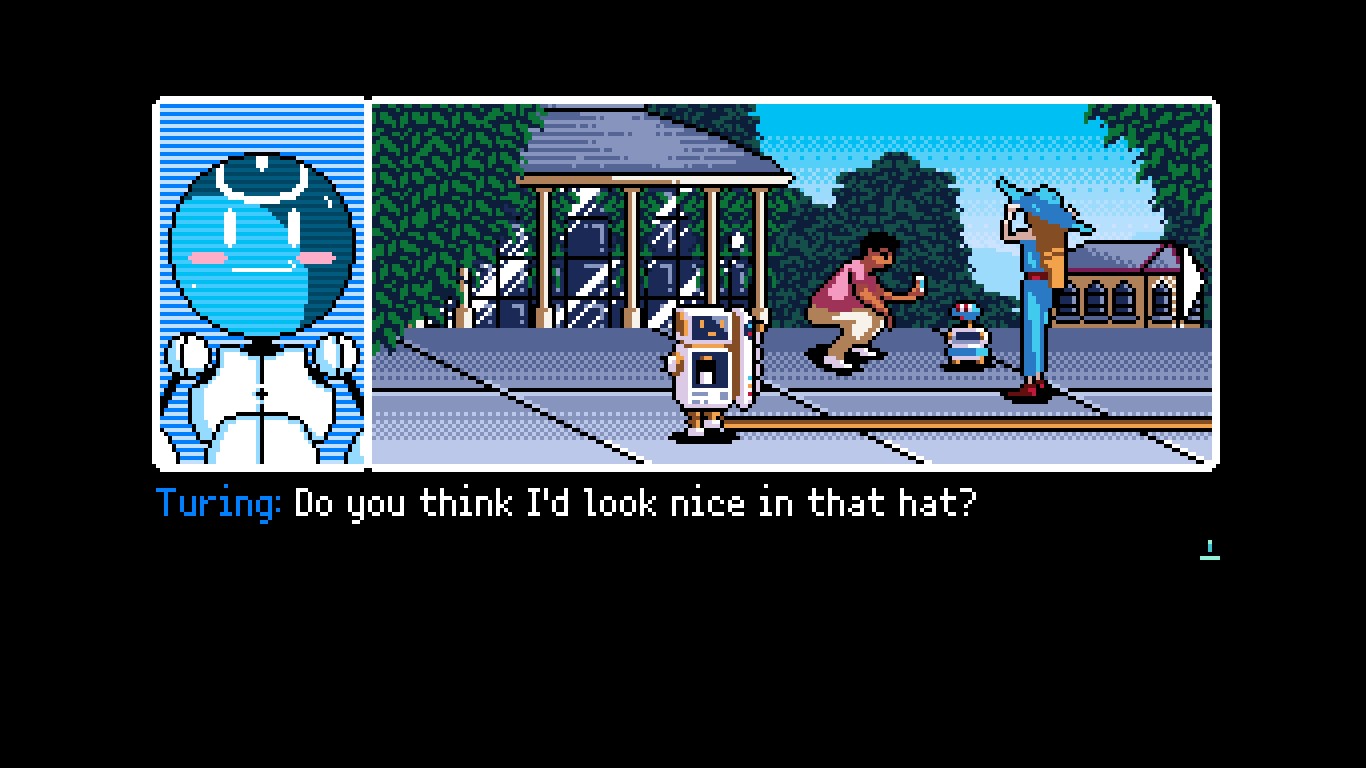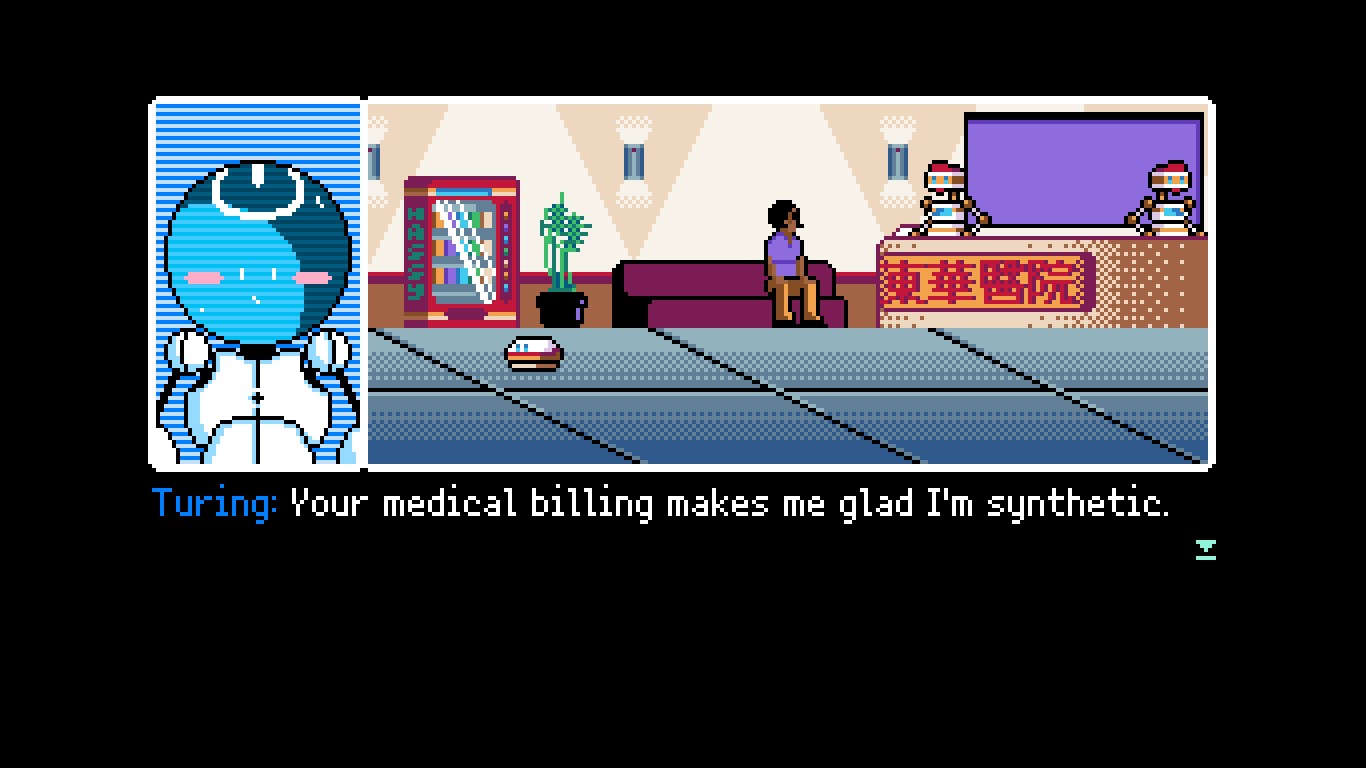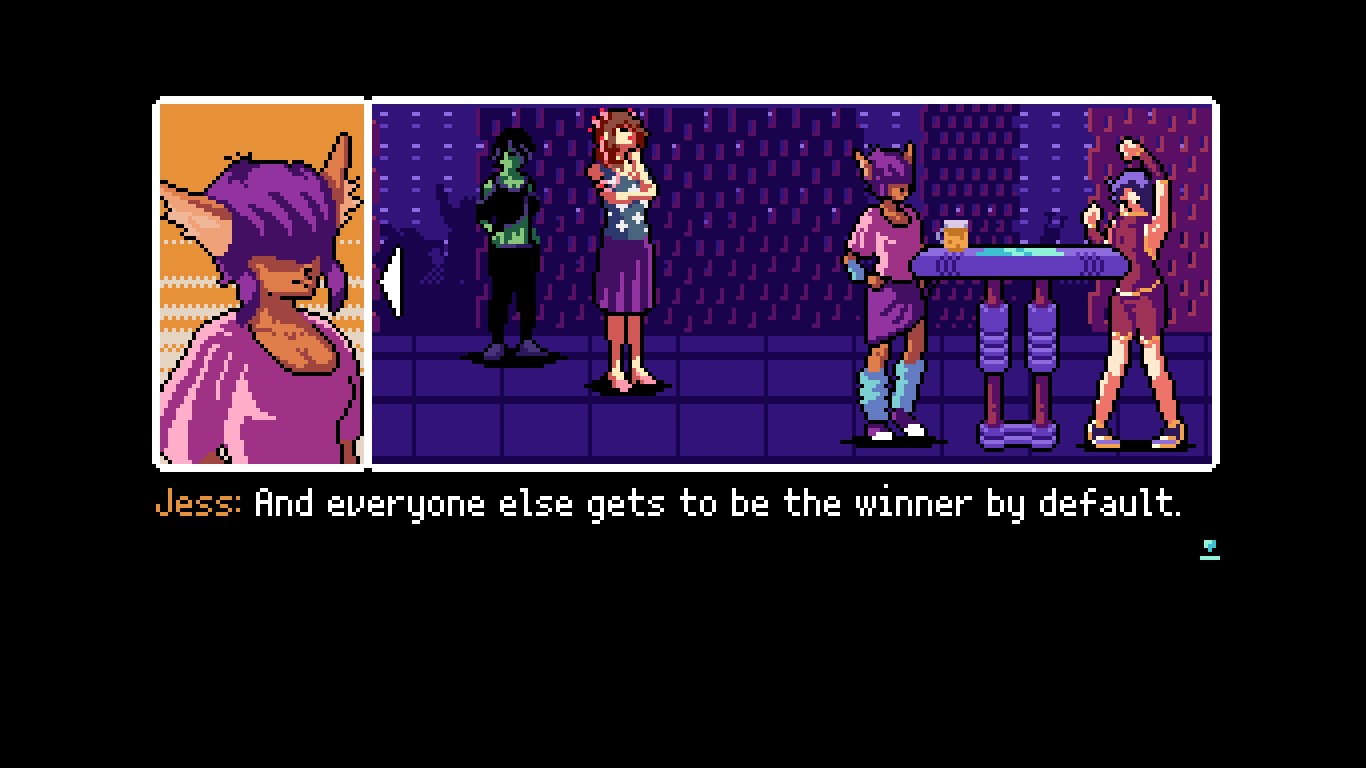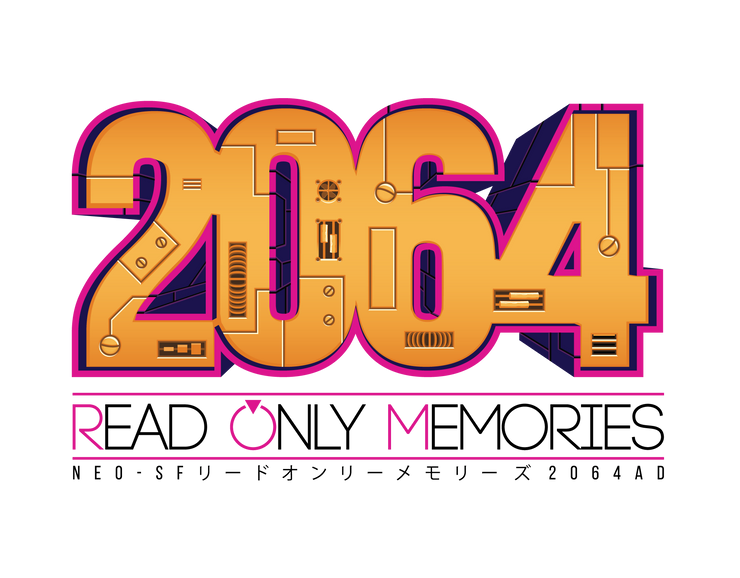When I first saw a trailer for what would become 2064: Read Only Memories, I remember being intrigued. After all, with a cyberpunk setting and appealing art style, it seemed right up my alley, and I looked forward to its release. Impressed as I was, though, I didn't expect it to become a game I would eventually hold very near and dear. When I played it back in late 2015 under its original name, Read Only Memories, the self-labeled "retrofuturistic take on the point-and-click adventure genre" absolutely stole my heart and firmly placed itself on my list of favorite games, and its highly revamped release, 2064: Read Only Memories, has only further solidified my love for the title. While it absolutely sparkled with smart writing and refreshing inclusivity even before its updated release, 2064 is somehow even more wonderful and fantastically written than ever.
Incredible writing is one of the biggest factors that sets 2064 apart from other games I've played in recent years. It's apparent the writing is clever from the beginning, even if all you have to go off of then is scattered commentary on household items and journalistic pursuits. As soon as you meet your new friend, Turing, a sapient robot who needs your help to investigate the mysterious kidnapping of their creator, though, the really excellent writing kicks in. The dialogue feels organic and smart, and the choices the player makes in that dialogue have weight -- they can change the path of the conversation, the investigation's order of events, characters' trust, and, eventually, the game's ending. The plot, though the order and turnouts of certain events are affected here and there by the player's dialogue choices, is fairly fluid and certainly riveting. The game version of a page-turner, 2064 compels you to get to the bottom of the mystery through tension, emotional commitment, and, well, the mystery itself.
Neo-San Francisco, the world of 2064, is well thought-out, with its own extensive politics and history, and having such a solid world to set the mystery in makes it even more enthralling. Having such intricate yet not-quite-convoluted politics and history for the area and its characters allows for more plot depth, and makes all the threads even more satisfying to connect. Additionally, having so many layers makes it easy to immerse yourself in the game world and enjoy the investigation fully.

The impressive character writing in 2064 is equally as beneficial to the storytelling as the world building is. Beyond the benefits of more interesting and believable dialogue, the characters being well-written and varied makes the investigation even more intriguing. Almost every character is fleshed out with their own personality and motivation, and this includes background characters. Working with people to advance becomes a fun challenge -- the player must decide who can be trusted, who they need to work with anyway even if they can't be trusted, and how to go about getting the information or access they need from people. Additionally, emotions associated with the characters can help make it seem more important to figure out what's going on, whether it's to help characters you care about or to find out what characters you distrust are hiding, and you can't develop feelings toward characters if they're flat and without substance. It's also worth noting there are plenty people of color in the 2064 cast, making the game more realistic and believable on top of being progressive. I don't believe 2064 would be nearly as great or immersive without its interesting and diverse characters.
The writing that constitutes the happenings, world, and populace of Neo-SF is made even more engaging by the game's other elements, i.e. its point-and-click interface, art style, music, and voice acting, combined smoothly to let players experience the great writing without any hiccups.
Point-and-click games have been around since the mid-80s but rarely seem to show up these days, perhaps because other types of games offer more action, so seeing a point-and-click adventure doing well in 2017 is pretty refreshing on its own. Popularity aside, point-and-click has some advantages over other genres when it comes to investigation. Point-and-click interfaces may be too limited for intense fights and world exploration, but the limited spaces they offer allow for more finely detailed scenes, pushing a lot of content into one place for players to dig into. This creates a deeper and more challenging type of investigation because there's so much there for players to sift through, but we can only hope that developers hit that sweet spot between "too little to be interesting" and "so much it's overwhelming" when crafting these scenes. 2064 certainly finds that balance, with plenty to interact with but not so much that it seems like an absolute disaster. The setup of this interface in 2064 is also very effective -- it's easy to use, lightweight, and fits the feel of the game.
Speaking of how the game looks, 2064 is really nice to look at. It's clear a lot of care went into the visuals, especially the character animations during dialogue. Being visually appealing makes it easier to lose yourself in the game, and it's especially helpful because there's so much investigation and observation to be done in 2064 -- you won't have to stare at anything too ugly, or strain to figure out what exactly you're supposed to be looking at. On a surface level, though, it's just plain nice to play a game with an appealing art style.
2064: Read Only Memories is also as nice to listen to as it is to look at thanks to the expertise of Matthew "2 Mello" Hopkins. As his website claims, 2064 is packed with "catchy synth tunes, nostalgic sound effects and professional voice acting" [ed. note: Sounds of Neo-SF is no longer featured on 2 Mello's website.] thanks to his hard work, and it's all the better for it. The soundtrack is damn near perfect even as a standalone album (you can buy it here, or listen to my top ten tracks list here [ed. note: this website no longer exists]), but it truly shines best when heard in-game. Every track fits the area, character, or situation it accompanies, and seems to breathe even more life into the experience.
The voice acting is the same way. In general, I'm at least a bit hesitant to believe voice acting is a benefit to any game without playing with it firsthand -- after all, I own Chaos Wars, so can you really blame me? Though I was a bit concerned about what voice acting would do to the original Read Only Memories experience, I was pleasantly surprised by the addition in 2064. Each voice fits perfectly, makes the story more engaging, and feels sincere, unlike the overdramatic or fumbled messes I've come to expect when booting up any game that boasts voice acting. My only complaint about 2064's voice acting is that, once you're used to playing with it, when you encounter unvoiced lines suddenly, it can be a bit jarring. Overall, though, the addition of voice acting is a big plus.

So far I've talked about large and fairly obvious pieces of 2064, but there's more subtle commentary in the game to praise. There's a lot of quieter silly commentary about the things in life that will never change, like the imperfection of voice-activated technology, the fear a clogged sink can evoke, and the staggeringly expensive world of healthcare, but the game also hits on some more serious themes. Perhaps most notable for the majority of players, 2064 shines a positive yet thoughtful light on the future of artificial intelligence, genetic manipulation, and cybernetics. It highlights the positives of this changing world, the dangers of corporate greed and tech-based violence, and the importance of preventing these dangers while protecting what new wonders we've stumbled into with technology. The game discusses advancing technology in a nuanced and hopeful manner that encourages the real world to move forward hopefully, bravely, and carefully. Additionally, many of 2064's characters deal with guilt and exploring themselves in a raw and vulnerable way in this changing world and their changing lives. 2064 certainly gives you a lot of complex thoughts about change and moving forward to chew on.
One of the most important things to me that 2064: Read Only Memories touches on, however, is its commentary on LGBT rights. Equality for LGBT folks is implicitly completely achieved (or at least incredibly commonplace) in Neo-SF, and openly LGBT characters play important roles all throughout the game. They aren't defined by their struggles (coming out, dealing with homophobia/transphobia, etc.), either, which is a breath of fresh air -- we're more than our struggles, and yet many LGBT characters are defined by the problems society hands them even today. That doesn't mean they follow the troubling rhetoric many non-LGBT writers seem to love -- that is, the idea that, because a character isn't defined by their gender or sexuality, it doesn't come up at all, or it only comes up for jokes or, worse, heart-wrenching tragedy that disproportionately affects LGBT characters because they're LGBT (if you don't know what I'm talking about, just Google the "bury your gays" trope). The LGBT characters in 2064 are alive and well, not being punished with homophobia, transphobia, heartbreak, or death in an effort to define them, and their gender and sexuality are made visible positively, making them wonderful and comforting representation. The game also lets you pick your own pronouns! The commentary that 2064 makes on being LGBT is that it is normal and something to be proud of, and that fair treatment can and absolutely will be achieved.
The commentary on LGBT people doesn't just show up in literal ways in 2064, though -- LGBT issues, and more specifically trans issues, show up in more figurative forms: hybrids, people who have genetic modifications, and the Human Revolution, who oppose these modifications. The Human Revolution very closely resembles today's anti-trans groups specifically because of how they treat hybrids, reducing them to people fulfilling some "sick fantasy," using derogatory terms against them, encouraging business to discriminate against them, saying interfering is good because it protects hybrids from themselves, and claiming "God designed [them] perfectly just the way [they] are" and that moving away from "his image" is horrible and wrong.

All of these ideals, and especially the claim that hybrids are going against God's image of them, mirror anti-trans speech often heard today, and the fact that genotypical people (non-hybrids) are "winner[s] by default" mirrors the privilege of cis people over trans people. Though it's subtle at first, the further you look into it, hybrids and the Human Revolution very clearly parallel trans issues in today's world.
So why is that important? What purpose is there to paralleling trans issues in a game where LGBT equality is commonplace? Including the Human Revolution in 2064 actually further strengthens the sentiment that LGBT equality is within reach, though it may seem odd at first. 2064 presents the Human Revolution as bigoted, and more firmly states this as the game goes on, and indicates they're losing support, so by paralleling the Human Revolution to anti-trans groups, the game effectively points out why anti-trans groups are also bad and will inevitably fail as trans people become more accepted, just as the Human Revolution will fail as hybrids are more accepted. It's yet another brilliantly constructed piece of the puzzle that is 2064.
There isn't a lot I can say that isn't good about the game. I will say that there are multiple possible endings, which can be daunting, even though it's fairly easy to tell what direction you're going in the game. Additionally, the game includes a fair amount of text, which may turn some potential players away (but it just comes with the mystery point-and-click territory, if you ask me). Otherwise, the only real nitpick I can come up with is how difficult it is to order off the extensive drink menu at Club Stardust.
Its few flaws aside, there are few games I would recommend more highly than 2064: Read Only Memories, and I encourage you to lose yourself in Neo-San Francisco and chase the mystery yourself as soon as possible. Absolutely bursting with clever commentary, inclusivity, and a riveting plot, it's a title you won't soon forget.
